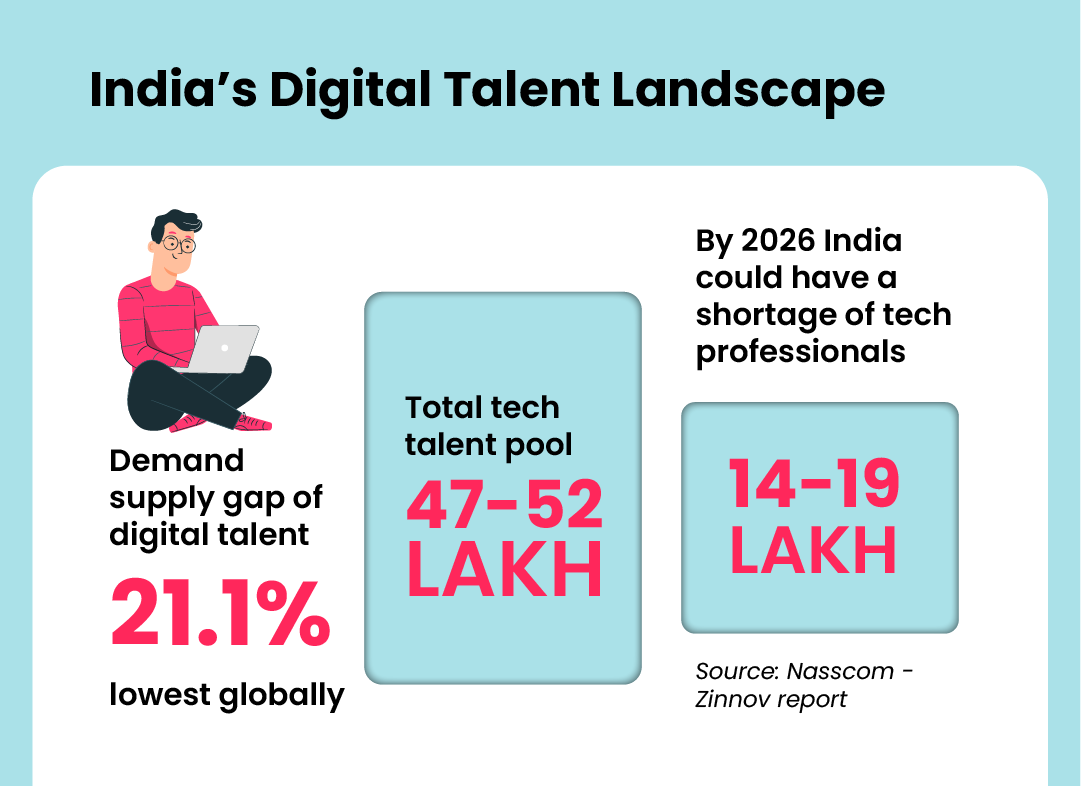The Great Skill Gap in Indian Tech Freshers

“Finding the right skills is a real problem in the tech industry, especially on the software side.” - Keri Gilder, CEO, Colt Technology Services
India’s growing tech industry is a fine example of the huge pool of talent our country holds. However, there still exists a staggering skill gap that holds back many job seekers from achieving success despite the demand.
According to NASSCOM, 2022 was a landmark year for India’s tech landscape. Not only did it record its highest ever growth at $227 billion in revenue, but the industry’s direct total workforce clocked in at a whopping 50 lakh.[1]

However, even as we see a huge influx of tech talent from colleges all around the country, a recent report by Nasscom-Zinnov suggests that India is going to face a shortage of 14-19 lakh tech professionals by 2026.[2]
The country is projected to have 75-78 lakh tech professionals by 2026, whereas the need may be of up to 93-96 lakh techies. But why is there such a disparity?
Addressing the IT skill shortage for newcomers.
India is headed toward a trillion-dollar online economy and a future fueled by digital transformation of goods, services, e-governance, and everything in between after experiencing a massive shift towards digitization during the epidemic. There is now a skills shortage in the IT sector in India. This indicates that there are more open positions than there are qualified candidates.
The skills gap between demand and supply.
Data scientists, machine learning professionals, cybersecurity, algorithm specialists, predictive analytics experts, data analytics, software development, cloud computing, computers, and artificial intelligence are just a few of the professions where new jobs are being generated. Freshers struggle to find lucrative positions in comparison to experienced employees who upgrade and reskill because they lack the proper guidance for updating their abilities, which limits the availability of jobs.
Why does the skill gap exist?
At first glance, it may seem like a matter of sheer numbers. As interest in the industry explodes, it’s only natural for more youth to be interested in joining the tech workforce.
According to industry estimates, while approximately 15 lakh engineers graduate in India each year, only a small minority is actually job-ready. And that is the skill gap, the bane of employers and candidates alike.
If a report by employability assessment company Aspiring Minds is to be believed, as many as 80% Indian engineers are completely unemployable in the growing knowledge economy. The average employability being merely 1.7% in new age jobs.[3]
“...only 3.84 percent of engineers in the country have the technical, cognitive, and linguistic skills required for software-related jobs in start-ups.”
Such is the state of Indian tech talent despite having 5860 institutions in 2022-23 offering engineering courses across the country, as per AICTE.[4] The main causes can be attributed to the overreliance on theoretical knowledge and an outdated curriculum in higher education throughout the nation.
“The syllabus is about 10 or 15 years old, and there has been no attempt made to upgrade the syllabus, and there has been a lot of resistance to change” - Stanley George, VP-HR, Hexaware Technologies
As a result, Engineering graduates are not equipped with the necessary knowledge and skills to apply their college education to a practical industry setting. Up to 60% of faculty do not focus on application of concepts, and a mere 47% of engineers participate in any industry talk.
“We find that a low proportion of engineers take up projects beyond curriculum and do internships. Further, there is a lack of faculty talking about industry application of concepts in class or students getting exposure through industry talks” - Varun Aggarwal, CTO and Co-founder, Aspiring Minds
It’s no wonder that despite programming, web, and app development being some of the most in-demand digital skills at the moment, only 5.5% of Indian engineers are equipped with basic programming abilities.[5]
Furthermore, companies do not want to spend time on “on-the-job-training” or “shadow working” as they want customised job profiles to match their demands. Now, the expectation is not just limited to knowing various tech stacks and platforms, but also soft skills like communication, presentation, and attention to detail, as stated by India education forum 2021.
"India's tech skill gap is a major challenge that we need to overcome if we want to continue to grow and innovate as a nation. It is crucial that we invest in education and training to ensure that we have a workforce that is equipped with the skills and knowledge necessary to succeed in the 21st century." - Anand Mahindra, Chairman, Mahindra Group
How can the issue be resolved?
By 2025, 67 percent of India's population will be of working age.
The pace of technological advancement is unprecedented. Students and professionals cannot afford to continue operating as they did in the past when they believed that one degree would cover their entire career. Although modifying the college curriculum is a slow process, many business executives believe that adding vocational courses to the school or college curriculum might help students develop important skills.
This makes us susceptible to technology that, in a few years, might completely change a sector. We need to discover alternative ways to develop the necessary skills for our workers if we want to stay ahead of the curve.
Both students and professionals must start taking charge of their education and understand that learning is a lifelong process. To remain relevant, we will need to update and upskill frequently. Here, the use of online learning tools and methodologies for on-the-job training can be crucial in assisting individuals in acquiring the most in-demand skills through the use of a curriculum that is skill-based, mentor-driven, and supported by industry and academic partnerships.
Experts with vast industry expertise train students at Masai, making sure they learn the most recent and in-demand IT skills and are prepared for the job market right away. To ensure that the skills of Masai alumni remain applicable to the business, curriculum modifications are also easily included in the curriculum.
If India can teach its kids the appropriate skills, it would be able to meet both its expanding demand for a trained workforce and the global demand for skills. However, to do this, skill-building programs for Indian youth must be extremely concentrated. If this is done correctly, India may be able to save itself and become the world's "Skill Capital."
The way forward…
So, attracting and retaining talent suited to the job is the number one priority for India, the 3rd largest tech start-up hub in the world. And to ensure the same, an increasing number of top companies like JP Morgan, Uber, Dream11, and Goldman Sachs are turning to skilling institutes like Masai.
“We have tried 2-3 skilling schools, but Masai is the top one. The one we think of when we have to hire. Directors who work with Masai alumni frequently say that they need more people like them. Masai students are focused, hard-working, disciplined, and task-aware. They do not require instructions on what to do and what not to do because they are familiar with (industry) standards.” - Deekshant Jain, Director of Engineering, NoBroker
Masai is a leading career institute bridging the gap between industry demand and India’s untapped talent pool, with over 2000 hiring partners. Every Masai student goes through 1200+ hours of practical training across an expansive curriculum which makes them industry ready.
In addition to extensive technical training, Masai focuses on holistic development of its graduates via soft skills training and industry mentors, ensuring they can perform on par with industry demands, and contribute tangibly to an organisation’s growth.
The school boasts of an expert faculty who are themselves industry veterans, drawing from their years of experience and Masai’s dynamic curriculum to prepare the next generation of Indian tech wizards. Providing a level of excellence and practical mastery that traditional institutes can’t replicate.
“I would not place my bets on the existing education infrastructure to train people. I think we need more platforms like Masai that really takes the accountability of uplifting students and giving them relevant knowledge in the tech domain. This is really needed to unlock India’s tech potential.” -Ankush Sachdeva, Co-founder and CEO, ShareChat
Masai is helping startups like ShareChat and No Broker scale up their operations quickly in a scenario where hiring the right tech talent typically takes an average of 24 days, whereas Masai can help organisations get the right talent in just 3 days with a high retention rate.
With FY2023 projected to be another year of significant growth for the tech industry, hiring and retaining a skilled workforce remains the foremost challenge for hiring managers nationwide.
But with over 2500+ students placed in top companies, Masai is determined to bridge the gap between industry demand and India’s emerging talent pool.
Want to get rid of your hiring woes? Click here to hire the Masai graduate perfect for your organisation.
-----------------------------------------------------------------------------------------
[1]https://nasscom.in/knowledge-center/publications/technology-sector-india-2022-strategic-review
[4] https://iirfranking.com/ranking/top-engineering-colleges-in-india

